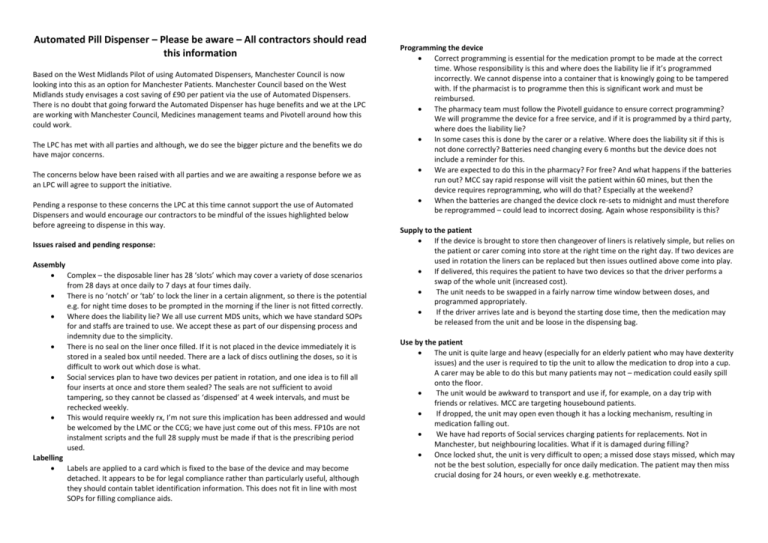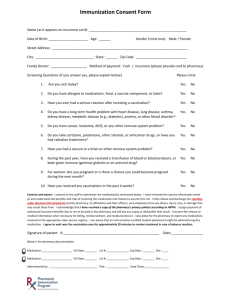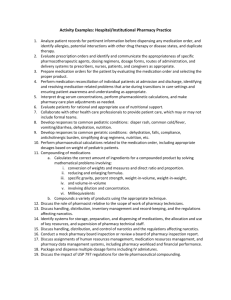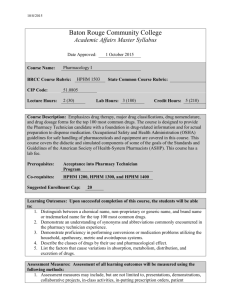Automated Pill Dispenser – Please be aware – All contractors
advertisement

Automated Pill Dispenser – Please be aware – All contractors should read this information Based on the West Midlands Pilot of using Automated Dispensers, Manchester Council is now looking into this as an option for Manchester Patients. Manchester Council based on the West Midlands study envisages a cost saving of £90 per patient via the use of Automated Dispensers. There is no doubt that going forward the Automated Dispenser has huge benefits and we at the LPC are working with Manchester Council, Medicines management teams and Pivotell around how this could work. The LPC has met with all parties and although, we do see the bigger picture and the benefits we do have major concerns. The concerns below have been raised with all parties and we are awaiting a response before we as an LPC will agree to support the initiative. Pending a response to these concerns the LPC at this time cannot support the use of Automated Dispensers and would encourage our contractors to be mindful of the issues highlighted below before agreeing to dispense in this way. Issues raised and pending response: Assembly Complex – the disposable liner has 28 ‘slots’ which may cover a variety of dose scenarios from 28 days at once daily to 7 days at four times daily. There is no ‘notch’ or ‘tab’ to lock the liner in a certain alignment, so there is the potential e.g. for night time doses to be prompted in the morning if the liner is not fitted correctly. Where does the liability lie? We all use current MDS units, which we have standard SOPs for and staffs are trained to use. We accept these as part of our dispensing process and indemnity due to the simplicity. There is no seal on the liner once filled. If it is not placed in the device immediately it is stored in a sealed box until needed. There are a lack of discs outlining the doses, so it is difficult to work out which dose is what. Social services plan to have two devices per patient in rotation, and one idea is to fill all four inserts at once and store them sealed? The seals are not sufficient to avoid tampering, so they cannot be classed as ‘dispensed’ at 4 week intervals, and must be rechecked weekly. This would require weekly rx, I’m not sure this implication has been addressed and would be welcomed by the LMC or the CCG; we have just come out of this mess. FP10s are not instalment scripts and the full 28 supply must be made if that is the prescribing period used. Labelling Labels are applied to a card which is fixed to the base of the device and may become detached. It appears to be for legal compliance rather than particularly useful, although they should contain tablet identification information. This does not fit in line with most SOPs for filling compliance aids. Programming the device Correct programming is essential for the medication prompt to be made at the correct time. Whose responsibility is this and where does the liability lie if it’s programmed incorrectly. We cannot dispense into a container that is knowingly going to be tampered with. If the pharmacist is to programme then this is significant work and must be reimbursed. The pharmacy team must follow the Pivotell guidance to ensure correct programming? We will programme the device for a free service, and if it is programmed by a third party, where does the liability lie? In some cases this is done by the carer or a relative. Where does the liability sit if this is not done correctly? Batteries need changing every 6 months but the device does not include a reminder for this. We are expected to do this in the pharmacy? For free? And what happens if the batteries run out? MCC say rapid response will visit the patient within 60 mines, but then the device requires reprogramming, who will do that? Especially at the weekend? When the batteries are changed the device clock re-sets to midnight and must therefore be reprogrammed – could lead to incorrect dosing. Again whose responsibility is this? Supply to the patient If the device is brought to store then changeover of liners is relatively simple, but relies on the patient or carer coming into store at the right time on the right day. If two devices are used in rotation the liners can be replaced but then issues outlined above come into play. If delivered, this requires the patient to have two devices so that the driver performs a swap of the whole unit (increased cost). The unit needs to be swapped in a fairly narrow time window between doses, and programmed appropriately. If the driver arrives late and is beyond the starting dose time, then the medication may be released from the unit and be loose in the dispensing bag. Use by the patient The unit is quite large and heavy (especially for an elderly patient who may have dexterity issues) and the user is required to tip the unit to allow the medication to drop into a cup. A carer may be able to do this but many patients may not – medication could easily spill onto the floor. The unit would be awkward to transport and use if, for example, on a day trip with friends or relatives. MCC are targeting housebound patients. If dropped, the unit may open even though it has a locking mechanism, resulting in medication falling out. We have had reports of Social services charging patients for replacements. Not in Manchester, but neighbouring localities. What if it is damaged during filling? Once locked shut, the unit is very difficult to open; a missed dose stays missed, which may not be the best solution, especially for once daily medication. The patient may then miss crucial dosing for 24 hours, or even weekly e.g. methotrexate. What actually happens if the patient is late for a dose, and the machine has moved on to the next dose? -If rapid response attends, how practical is it to have a new device delivered? o If is outside of pharmacy hours then? o If there are no prescriptions available at the pharmacy how can a legal supply be made? Do GPs understand this implication? If it is outside of GP hours, is there GP provision? How is pharmacy provision provided, for that patient from their specific pharmacy? Out of hours service available but is a CCG service, do CCG understand implications? It is not just overnight, but weekends also. Council cannot direct patients away from their specific pharmacy, this is direction of prescriptions, an NHS service. Not just that, there is a major clinical risk attached - there would be no distinct patient record to work from – GP closed, pharmacy closed! What would the out of hours GP prescribe from? Labels? Detached labels? o o o o o Pharmacy issues The complexity of the unit means that it takes considerably longer to fill than a Medisure pack, meaning that store teams may not have sufficient hours to fill Pivotell safely. This leads to increased pressure and risk. We have tested this in store, and there is significantly more time spent on a Pivotell. Not only that, when returned, they are often full of debris and dust and not fit for purpose with respect to medication. Who is responsible for their upkeep? How easy is it to keep clean? The unit is potentially more difficult to accuracy check due to the space available and layout of the liner, and the distinct lack of dosing outline. As the unit is not sealed there are potential medication stability issues from moisture ingress. There is new RPS guidance due addressing this as a major concern, not just for automated pill dispensers. There are concerns around availability of drugs in the same compartment, increased moisture only adds to this. The cost of filling the device would seem to be considerably more than the service fees currently being offered. Other Issues: Safekeeping in the patient’s house would then also need to be considered as part of the initial review SLA as is not sufficient, the template from Pivotell is not adequate, nor is the Midlands SLA. No payment – without payment the filling of the devices is an extreme burden on the dispensing process. Who is to pay for the consumables? How are they delivered and how regularly? How much are the consumables? What happens if the medication does get tampered with? Cost implications are rapid response, drug costs and an out of hours bill. CCA have grave concerns re Pivotell, members have already stated they will not fill these devices as the products have not been evaluated. Social services have said they are doing training – are they therefore maintaining liability for this? What interaction is the pharmacist having with the patient to decide on adjustments required – the decision seems to be being taken by social services, and without any other input, are GPs involved in the process? Medicines not suitable for Pivotell – what is happening to them? This is an area of major concern. There have been many reports of some oddly shaped tablets jamming the machine, or not even fitting? What happens in this situation? Summary There are a number of concerns with regards to Automated pill dispensers, namely around safety and liability. If the liability is to addressed the implications would increase the workload for pharmacy and thus should be a paid service. These issues need addressing before many practical supply issues can be. Once we are in a position to discuss supply we need to look at specific pathways of care for the patient. Use of rapid response and out of hours GP services needs to be clarified as well as prescribing implications. What is to happen with medication that cannot be placed into the dispenser? Case study A pharmacist who fills a Pivotell – reluctantly – for her mother. She didn’t trust Social services to programme it as they didn’t fill her with confidence, and won’t visit her mother unless she had one. ‘Problems are that although you get a spare circular pill container there are no proper covers or extra paper discs giving the dosage times and to stop the pills falling out, or extra paper discs giving the dosage times so you could have to send out a filled container with no markings on and the filled container has to be dropped in the Pivotell at the correct start point or you'd end up giving tablets at the wrong times. Other problems are they can be tampered with (even when locked as my mum forced hers open with a knife to get an extra sleeping tablet! It's been knocked on the floor a couple of times and came undone - pills everywhere! and the last time she did that it broke completely and she had to pay £192.00 to social services to get a new one!’






